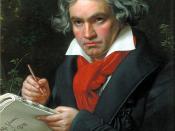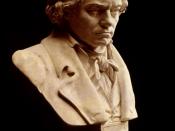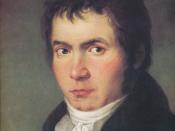Beethoven is perhaps one of the most well know musical artists in the world. As a German composer and phenomenal pianist, Beethoven gave classical music a new power and intensity. He led a remarkable life, and during his lifetime he was able to open new realms of musical expression that continue to influence musicians today.
Ludwig van Beethoven was born in Germany in 1770 and died in 1827 at the age of 56. It was obvious that he was a naturally talented musician, because by the age of 12 he has several compositions published. His first teacher was his father, Johann. It is said that his father was a very demanding instructor, and that after long nights of drinking, Beethoven's father would sometimes drag his son out of bed to practice the piano or play for guests.
Beethoven was sent to Vienna at age 17 to meet Mozart and to further his musical education.
Vienna was the capital city in terms of culture and music. It is not known whether he was able to meet or study with Mozart. However, Beethoven did make numerous acquaintances in Vienna. Everybody in the musical and aristocratic world was in awe of his musical talent.
By nature, Beethoven was impatient, impulsive, unreasonable and intolerant. Many believe that his deafness played a major role in his unpleasant mannerisms. Beethoven began to loose his hearing around 1796, and became completely deaf by 1814. However this did not stop him from pursuing his passion. He continued to compose and conduct even after he had experienced complete loss of hearing. Interestingly, he used a special rod attached to the soundboard on a piano that he could bite; the vibrations would then transfer from the piano to his jaw to increase his perception of sound. It has been said...



Ode to Joy
Your essay is very informative
The structure is also very good
Well done =D
0 out of 0 people found this comment useful.